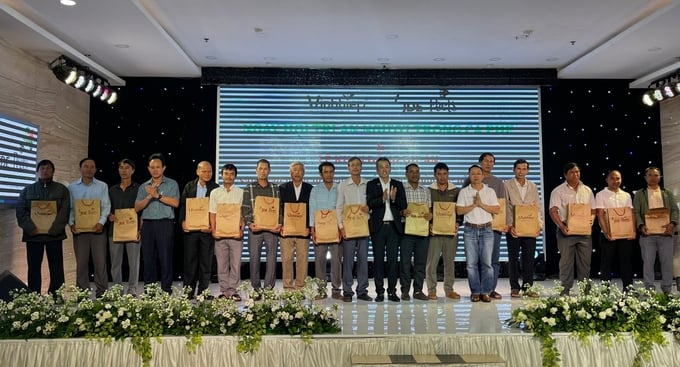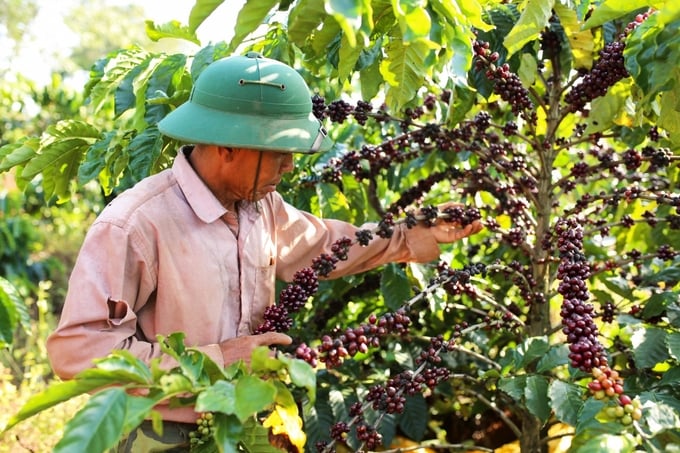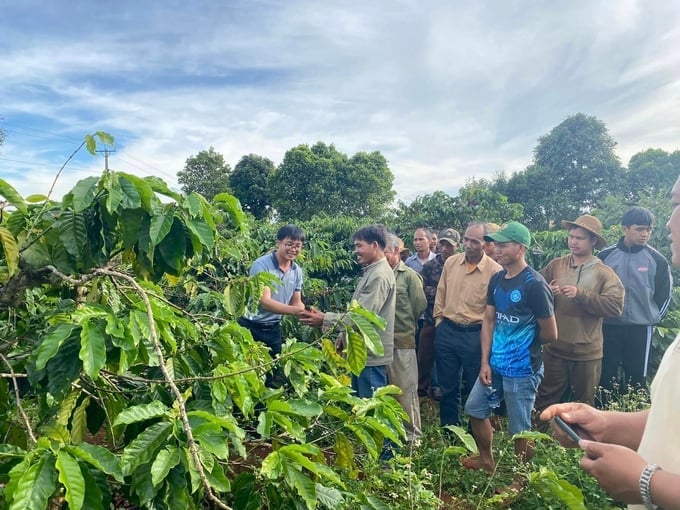May 16, 2025 | 10:34 GMT +7
May 16, 2025 | 10:34 GMT +7
Hotline: 0913.378.918
May 16, 2025 | 10:34 GMT +7
Hotline: 0913.378.918
The appreciation day for coffee farmers was held in conjunction with the launch ceremony of the project "Enhancing Capacity and Accessing Production Support Resources for Coffee Production in Indigenous Communities; Promoting Emission-reducing Coffee Production Methods in Compliance with EUDR in the provinces of Gia Lai and Kon Tum."

Honoring 15 exemplary farming households in the coffee production partnership with Vinh Hiep Company. Photo: Dang Lam.
The event was attended were representatives from the Gia Lai province's Department of Agriculture and Rural Development, Mr. Do Ngoc Sy - Director of Sustainable Asia-Pacific at JDE Peet’s, Ms. Nguyen Viet Ha - Senior Sustainable Manager of the 4C organization, Mr. Bach Thanh Tuan - Director of the Community Development Center (CDC), along with representatives from the Departments of Agriculture and Rural Development from various districts involved in the project, and over 400 coffee farming households across the provinces of Gia Lai and Kon Tum.
During the event, Mr. Thai Nhu Hiep, Chairman of Vinh Hiep Limited Liability Company, expressed his sincere appreciation towards coffee farmers who have supported his company over many years. He also introduced the collaborative project with JDE Peet’s, with the aim of engaging in practical activities to support coffee farmers in the near future.
Throughout the thirty-year history of unwavering commitment to the coffee industry, Vinh Hiep Company has been engaged in sustainable programs for 14 years (since 2009). Additionally, Vinh Hiep Company has initiated several meaningful projects with the goal of promoting sustainable organic coffee production practices, thereby enhancing livelihoods for coffee farmers in the Central Highlands provinces.
Mr. Kren, an ethnic BahNar residing in Gla commune, Dak Doa district, Gia Lai province, owns a 1.5-hectare coffee farm. Additionally, his farm has been part of the sustainable coffee production linkage with Vinh Hiep Company for six years. Mr. Kren recalled that his family previously produced coffee using traditional practices, leading to fluctuating productivity which is dependent on the weather, inconsistent yields, and reliance on intermediaries in the market.

Coffee farms under collaboration with Vinh Hiep Company consistently ensure a 100% harvest rate of ripe fruits. Photo: Dang Lam.
"After participating in the sustainable organic coffee production linkage with Vinh Hiep Company, our coffee farm has consistently provided high yields and stable productivity. Our family's 1.5-hectare coffee plantation is expected to yield at least 15 tons of coffee beans during this harvest season. When the coffee prices plummeted, Vinh Hiep Company offered policies to support prices, and prevent losses for us farmers," shared Mr. Kren.
According to Mr. Thai Nhu Hiep, the project on "Enhancing Capacity and Accessing Production Support Resources for Coffee Production in indigenous communities; Promoting emission-reducing coffee production methods in compliance with EUDR in the provinces of Gia Lai and Kon Tum" is entirely environmentally friendly. This project has a total investment capital of 581,888 EUR, implemented over a 5-year period in the districts of Dak Doa, Mang Yang, Chu Se, Chu Prong, Duc Co, Chu Pah in Gia Lai province and Dak Ha, Ngoc Hoi in Kon Tum province. An estimated 10,000 farming households are expected to beneficiaries under the project.
With the project, coffee farmers will enhance their access to sustainable coffee production techniques towards regenerative agriculture. It will facilitate production connections and transfer excellent technical models to enhance financial management awareness, financial autonomy, gender equality, and labor rights within production linkages. Additionally, the project will promote greenhouse gas emission reduction in coffee production and establish a database to comply with European regulations on forest-friendly production (EUDR).
Mr. Thai Nhu Hiep added that the project marks the beginning of Vinh Hiep Company and JDE Peet’s journey in the vital coffee industry. "Many more projects will be established in the future under the partnership between Vinh Hiep Company and JDE Peet’s to accompany coffee farmers in the Central Highlands. I hope that you will all embark on this project with enthusiasm. We aspire to collectively revolutionize coffee production towards sustainability for a greener agricultural sector," Mr. Thai Nhu Hiep encouraged coffee farmers involved in the project.

Farmers visiting the 4C-certified coffee farm belonging to Vinh Hiep Company. Photo: Dang Lam.
Mr. Do Ngoc Sy stated: "JDE Peet’s caters to the coffee demand of 150 countries and territories worldwide. Furthermore, JDE Peet’s plans to purchase the entire coffee output of Vietnam by 2025."
"Vietnamese coffee bears a very distinctive, unique flavor that no other country can match. I hope that coffee farmers will strictly adhere to regulations and standards such as origin traceability, forest protection, clean coffee production, prohibition of child labor exploitation, and gender equality," shared Mr. Do Ngoc Sy.
Ms. Nguyen Viet Ha, Senior Sustainable Manager of the 4C organization (which implemented the 4C principles - a common set of rules for the Coffee Community Association, headquartered in Bonn, Germany) noted: "Vinh Hiep Company has been a highly reputable business in the field of coffee sourcing, procurement, processing, and export for many years. Vinh Hiep's coffee products consistently meet the economic, environmental, and social criteria."
"The 4C organization will continuously support Vinh Hiep Company as well as other coffee companies in Vietnam to bring the taste of Vietnamese coffee to the global market in a transparent manner," Ms. Ha added.
Vinh Hiep Company has become one of Vietnam's leading responsible businesses in coffee production, procurement, and export. This achievement owes a significant contribution to coffee farmers in the Central Highlands, cooperatives, certification organizations including 4C, RA, CDC, and the vital support of Gia Lai province’s governmental departments.
Stakeholders in the coffee industry have all devoted to the prominence of Vietnamese coffee products in the global market. "I affirm that Gia Lai province's robusta coffee has the highest quality in Vietnam, which is recognized and loved globally," emphasized Mr. Thai Nhu Hiep.
Translated by Nguyen Hai Long

(VAN) Cold-barn systems efficiently manage environmental and temperature conditions, which aids in the prevention of respiratory diseases in pigs and protects them from the vectors that transmit African swine fevers.

(VAN) To tackle challenges, the project 'Addressing key technical bottlenecks in the grouper supply chain in Vietnam' has been underway since 2024.

(VAN) The project 'Disease-Resilient and Sustainable Cassava Production Systems in the Mekong Region', funded by the Australian Center for International Agricultural Research (ACIAR), is being implemented from 2024 to 2028.

(VAN) Data from 10,000 farming households will help professionalize production organization and support the implementation of the One Million Hectares Program for High-Quality, Low-Emission Rice Cultivation.

(VAN) FAO Director-General QU Dongyu marks International Day of Plant Health at NENA conference.

(VAN) Deputy Minister of Agriculture and Environment Hoang Trung affirmed that floriculture and ornamental plants are a growing industry that receives significant global attention.

(VAN) The three staple crops dominating modern diets – corn, rice and wheat – are familiar to Americans. However, fourth place is held by a dark horse: cassava.